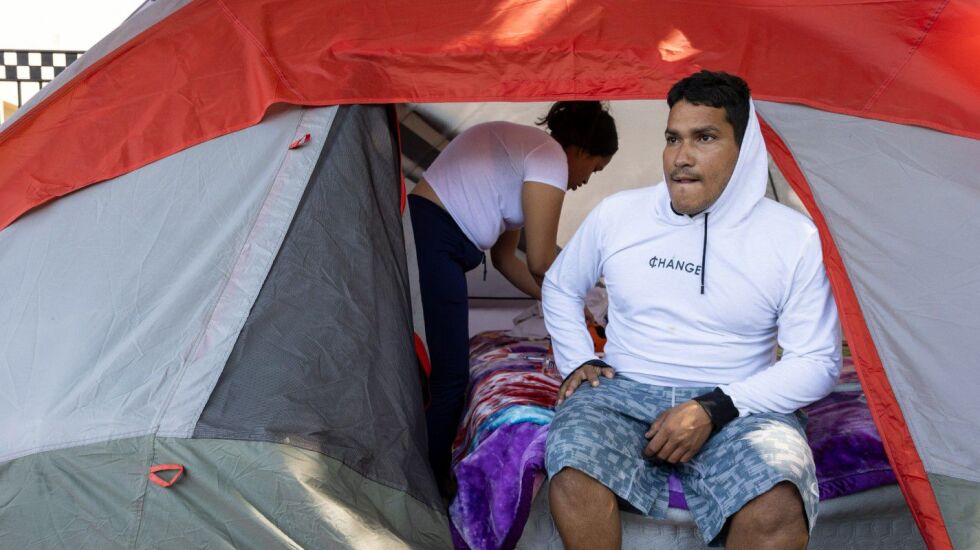
Steps from the 12th District police station on the Near West Side, Alex Rossi sweeps the entryway to a red camping tent that holds his life’s belongings.
He lives in a cluster of tents in a grassy field with other Central American immigrants who have fled their native countries. For Rossi, sleeping under the thin tent lining gives him a modicum of freedom over his life that has been marked by upheaval.
In Chicago, a self-proclaimed sanctuary city, Rossi’s other options aren’t much more forgiving: wait for weeks for a spot in maxed-out city shelters or sleep on the floor of police station lobbies.
Nearly a year after the first busload of migrants arrived, Chicago still lacks an infrastructure to house, feed and care for the more than 11,000 asylum seekers who have found themselves in the city.
Driven by a need to help, a constellation of nonprofits, advocates and everyday Chicagoans have been trying to fill in the gaps.
Outside the 12th District station, new arrivals have created a community of their own. A rug laid out on the grass at the entrance to the tents marks an informal gathering space where people sit and talk. An unplugged refrigerator gets filled with ice to keep food cold. One of many children living there for now abandons a ball after it rolls across a busy street and comes to a stop under a parked car.
In his tent, Rossi can keep his immigration documents and belongings close by. But being out in the elements also can leave him exposed. An orange traffic post rigged with a piece of string keeps a plastic tarp in place over the tent to offer some protection from the rain. But water still leaks in.
“This isn’t life,” Rossi said in Spanish. “You can rest, but this isn’t life.”
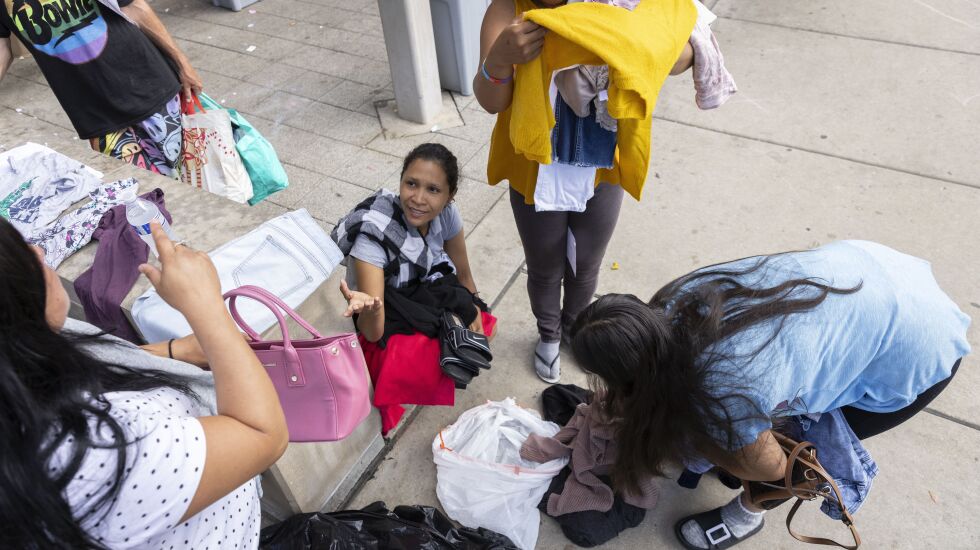
Tents over police stations, shelters
Rossi wakes up at 5 a.m. to try to look for work. Sometimes, he gets small gigs. He sees people driving for Uber and laments his lack of a car. Without steady income, he wonders how he will ever find a place of his own.
“I’m happy to work because that’s my goal,” Rossi said. “Because I want to fight and learn each day a little more than what I knew.”
It’s a sense of stability that many new arrivals at the 12th District station crave.
Migrants sleeping inside the police station say they feel they have little choice but to be tied to the location when they don’t know when a bus might arrive for a city shelter.
“What we want to know is if they can get us out of here as fast as possible,” Juan Carlos Blanco Cassiani, a Venezuelan immigrant who has lived at the shelter for weeks, said in Spanish. “Because there are too many kids.”
As of late last week, more than 770 people were staying in police stations in Chicago and another three dozen are at O’Hare Airport, waiting for a spot in city shelters already housing more than 5,260 people. Some have left for the suburbs or other states.
In the tents in the field near the police station, one woman is two months pregnant. Other women staying at the station and in the tents have had miscarriages, according to Veronica Saldaña, a 12th District police station volunteer.
“I mean, they’re sleeping on the floor,” Saldaña said through tears. “It’s just hard.”

Migrants fear for children’s safety
All kinds of people enter the station’s revolving doors — including some who appear to be mentally unstable or drunk. Migrants say one man showed up and got naked in front of them.
Lupe Puga, a Pilsen resident who volunteers at the police station, has heard the stories.
“They’re described as people that are zombie-like, that scare the children,” Puga said. “They come in the middle of the night, and then the moms feel like they can’t sleep because they fear for their children’s safety.”
The station is usually quiet during the day as people search for housing, food and legal help, said Ald. Byron Sigcho-Lopez (25th). At night, though, or when it rains, the lobby can be crowded with young kids.
“We’re being very vocal about the dangers that it is to leave people in police districts,” Sigcho-Lopez said, pointing to towering stacks of blankets and pillows that line the walls while an employee mops the floor.
The police oversight body and Bureau of Internal Affairs are investigating accusations that Chicago police officers committed sexual misconduct against a migrant who’d been housed at the 10th District police station. Mayor Brandon Johnson’s office says the accusation involves sexual misconduct against a minor new arrival. The accusations prompted Johnson’s administration to move those living there. The goal is to stop housing migrants at police stations altogether.
Johnson is working to open additional city shelters while expediting the resettlement of asylum seekers into more permanent housing by helping them to pay rent.
The strain on the city has exposed longstanding systemic issues, Sigcho-Lopez said. Volunteers and faith-based organizations have stepped up to provide services, but they are not a permanent solution, he said.
Sonia Lopez, an employee of the Little Village nonprofit New Life Centers, says she worries the sexual misconduct accusations could result in losing migrants’ trust.
“I almost feel like the situation with the police officer almost tarnished what we do,” Lopez said. “It makes us as Americans just look like … are we taking advantage of this situation?”
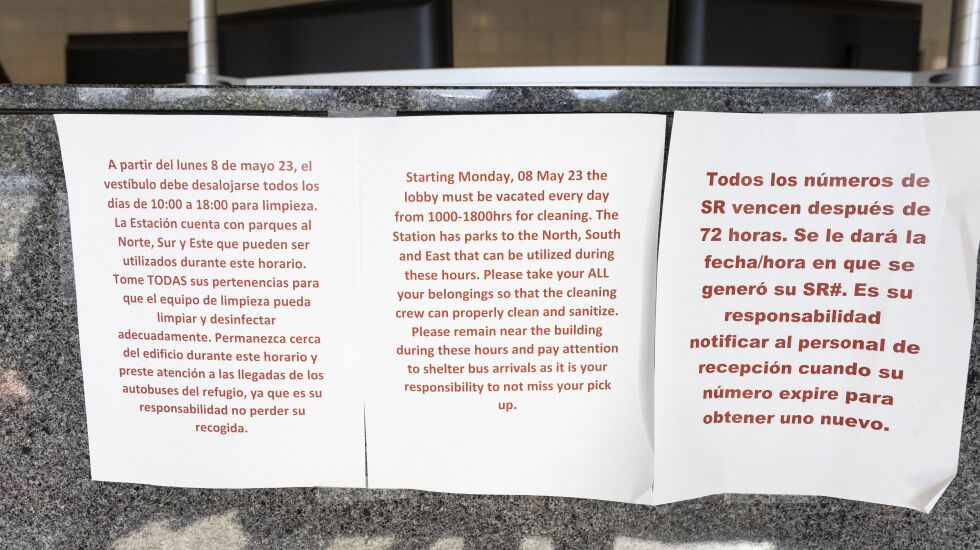
‘Last line of defense’
At the 12th District police station, families sat on the sidewalk in patches of shade while the station was cleaned — a daily routine that forces them outside for hours. Towels and clothes dried out under the sun.
Donated food delivered on this particular morning was quickly picked over. Another delivery — sandwiches, fruit and bottled water — was nearly gone within 15 minutes.
Saldaña works at the Pilsen Food Pantry, a 10-minute walk away, as the nonprofit’s volunteer coordinator. She tries to bring donations to the police station, rather than have people come to the pantry, to ease asylum seekers’ fears of missing a bus to a shelter. Her morning rounds checking in with migrants have become a part of her routine. Her own kids wait in her idling van before she drops them off at summer school.
Sometimes, it feels like she spends too much of her time at the police station, Saldaña said. But then she thinks of the missed connections of recruiting neighbors to volunteer if she hadn’t spent the few extra minutes there.
She also thinks of her late grandmother, who immigrated to Chicago in the 1940s and raised eight kids but still always gave her neighbors a humble meal.
“She would always have a pot of beans on the stove,” Saldaña said. “She didn’t have much, but she wanted to be able to at least offer something to people who came by.”
If her grandmother were alive, Saldaña said she would be cooking for those staying at the police station. It’s a faithfulness to serve that she plans to carry on.
“We’re definitely a last line of defense for them — their only line of defense in some ways, right?” Saldaña said. “So, as long as they’re there, we’re just gonna keep showing up and doing what we can.”
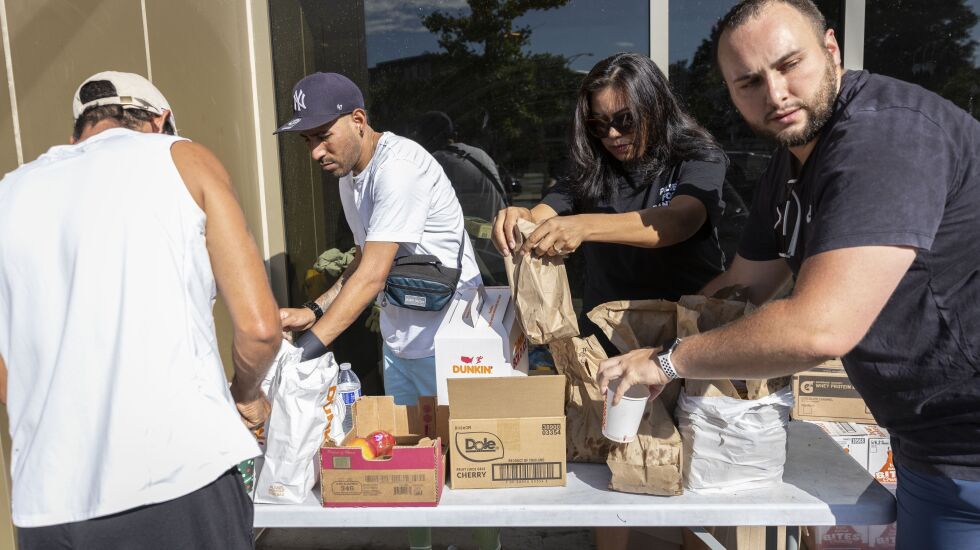
‘Praying for a job like this’
A short drive from the 12th District station, Yanet Sandoval pulled up to another police station hosting migrants — the 9th District in Bridgeport — in an unmarked van and hopped out.
“Banar. Banar,” Sandoval called out in Spanish — “Bath. Bath.”
She offered a ride to a mobile shower station set up on 27th Street in front of New Life, but just a few went along.
Her next stop was to offer showers to migrants staying at the 8th District police station about 30 minutes southwest.
Driven by her faith, Sandoval said she quit her job at a suburban UPS warehouse to take what was supposed to be just a two-month job with New Life. She’s an immigrant from Mexico who came to the United States when she was 5 and grew up in Little Village.
“I was praying for a job like this to help others, like to help the migrants,” Sandoval said. “I want people to see God in my face, that I can reflect his love for them.”
She couldn’t recall having an arduous journey from Mexico as a child, unlike the stories she hears from migrants on the drive to the next police station. Sitting behind her in the van, John Ortega, 31, spoke of leaving his wife and son in Venezuela to shield them from the dangerous journey he went through to get to Chicago.
After Sandoval pulled up to 27th Street, Ortega and the other passengers made their way to the clothes and coffee in the basement of New Life. They waited their turn at a trailer outfitted with private showers.
Ortega, who hadn’t showered in eight days, says he’s grateful for helpers like Sandoval. He said he didn’t expect it and wished he could show how thankful he is.

Long road to stability
The cast of Chicagoans piecing together meals, showers and clothes for migrants know this is just the beginning of a much longer journey for them: seeking legal asylum status.
Roughly two miles from the 12th District station, attorney Alexis Aranda Zelasko ticked through a form with information to help her craft an asylum application for a recent arrival named Johanna, who asked that her full name not be published to protect her privacy and safety.
Aranda Zelasko also asked questions such as what would happen to Johanna if she were forced to go back to Venezuela. Johanna said she was abused as a child, then mistreated by the father of her children.
Talking through such details can be difficult, but an incomplete or watered-down story could be detrimental to an application for asylum, Aranda Zelasko said.
“These forms ask you to be a narrator — and an award-winning narrator of your story because this is your one shot,” Aranda Zelasko said.
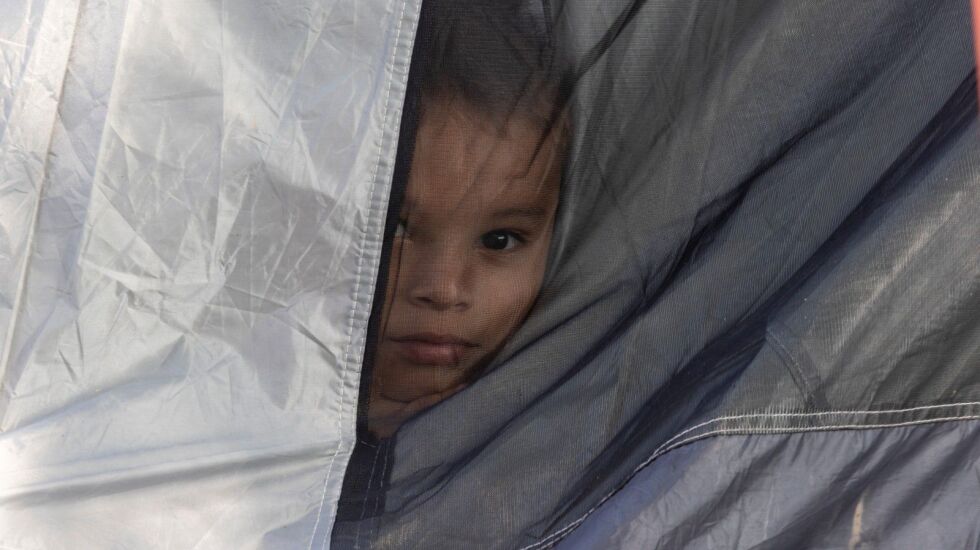
Johanna is described as being withdrawn because of what she has experienced.
“So many things that have happened to me in my life … how do I explain?” she said through tears. “I’m sorry that I’m crying … I left my home when I was 9 years old because my dad abused me. After all that, I’m like this ... I try to talk to people, but I shy away, I get scared.”
Aranda Zelasko said many migrants who’ve come seeking legal asylum won’t qualify and won’t be advised by an attorney even to apply. Asylum applicants have to show they would be or have been persecuted by their government — or an entity the government can’t control — based on a protected class such as race, religion or political belief, Aranda Zelasko said.
Johanna’s asylum process — if she ends up being successful — could take five years or more, Aranda Zelasko said. But, unlike thousands of people staying in shelters, she has some stability as she waits.
Since arriving in Chicago on a bus from Texas in October with her three children, Johanna has secured many of the things migrants in police stations are longing for, including a home with rental assistance and a steady job at a factory.
“I tell single moms, don’t be scared to be alone,” she said. “You’ll find support.
“I have found support here. I’ve had lots of help here. Being in the U.S. — it changed me a lot. I’m not going to say it changed me completely. But a lot.”
Contributing: Manuel Martinez, Araceli Gomez-Aldana.







